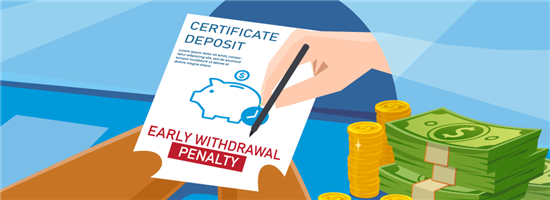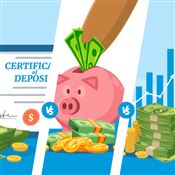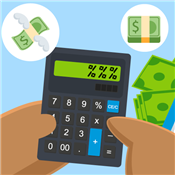CD Early Withdrawal Penalty
Ad Disclosure: This article contains references to products from our partners. We may receive compensation if you apply or shop through links in our content. This compensation may impact how and where products appear on this site. You help support CreditDonkey by using our links.
Don't let CD early withdrawal penalties catch you off guard. Learn what they are and how to avoid them.
 |
With a certificate of deposit (CD), your money is tied up for some time. Not a bad deal, if you locked in a decent APY.
But what happens when you need to withdraw your money early?
Unfortunately, you get early withdrawal penalties. And you might lose your earnings to these charges. But how does it work and how do you avoid them? Read on to find out.
What is a CD Early Withdrawal Penalty?
An early withdrawal penalty is a fee that you pay when you withdraw or close your certificate of deposit before it matures. When getting a CD, you basically enter a contract to keep an amount of money in your account for a set term.
In exchange, you usually get a fixed rate that is relatively higher than on a regular savings account. But, you have to commit to the term, or else you'll need to pay the applicable penalty.
Most CDs won't allow you to withdraw your money prematurely. You will need to pay early withdrawal penalties so make sure to review the disclosures of a CD before investing.
How Much is a CD Early Withdrawal Penalty?
Usually, CD early withdrawal penalties will average around several days to several months' worth of interest. Banks and credit unions can set charges at their discretion. But, most penalties will depend on the length of the CD term.
Here's a glimpse of the CD early withdrawal penalties that banks typically impose:
- CD Terms 12 months or less: averages 90 days of interest on the amount withdrawn
- CD Terms more than 12 months to less than 60 months: averages 180 days of interest on the amount withdrawn
- CD Terms more than 60 months: averages 365 days of interest on the amount withdrawn
Your bank or credit union will usually provide details about early withdrawal penalties for your CD. Be sure to review the terms or ask a representative before opening or closing a CD prematurely.
CD Early Withdrawal Penalty Calculator
Use this CD Early Withdrawal Penalty calculator to figure out how much you need to pay when you close your CD before the term ends.
Take note: depending on whether your penalty is in days or months, and how your bank defines it, the calculation for your CD can differ. For example, to manually calculate the early withdrawal penalty in days, you can use this formula:
Early Withdrawal Penalty = (APY ÷ 365) × Penalty × Principal
- APY = Annual percentage yield in decimal form (e.g., a 1.75% APY is 0.0175)
- Penalty = Early withdrawal penalty in days
- Principal = Amount deposited in the CD
Say you have $1,000 in a 1-year CD with a 5% APY. And, it has an early withdrawal penalty of 90 days. The penalty will be calculated like this:
Penalty = (0.05 ÷ 365) × 90 × 1000 = $12.33
If you withdraw your CD early, you will have to pay around $12. If you withdrew just 3 months (90 days) into the term, you would lose all your interest earnings to penalties.
In some cases, you can lose a part of your principal if you withdraw too early that your CD hasn't earned enough to cover the charges. If you're planning to close your CD early, calculate how much you'll be losing to penalties first.
Exceptions to CD Early Withdrawal Penalties
Some institutions may waive your early withdrawal penalty at their discretion if you have a good reason to back it up. The common exceptions to a CD early withdrawal include:
- CD owner has passed away
- CD owner is determined legally incompetent
- CD owner becomes disabled
- CD is part of an individual retirement account (IRA)
- CD is part of an IRA and the CD owner has reached age 72
The laws affecting your CD might also change over time, specifically for IRA CDs. But, it can't hurt to ask a bank representative if you can waive your penalties.
How to Avoid CD Early Withdrawal Penalties
If you plan and strategize correctly, you can minimize or dodge early withdrawal penalties. Here are some ways to avoid them:
Choose a CD term that fits your goal
Like any goal, you want to make sure you have a defined timeline for your CD. Don't choose a term that's too long for you.
If you worry about long lock-in periods, try short-term CDs. A shorter term and a good APY should be enough to keep you from withdrawing early.
- Community Bank & Trust (GA):
6-Month CD - 4.60% APY - Leader Bank:
6-Month CD - 4.50% APY - Liberty Federal Credit Union:
6-Month CD - 4.50% APY - HAB Bank:
3-Month CD - 4.50% APY - Pelican State Credit Union:
12-Month CD - 4.49% APY
Get a No-Penalty CD
A no-penalty CD works like any other CD–except you don't have to pay early withdrawal fees. But, you may have to wait a week or two after you open the CD before you can withdraw it.
Build a CD Ladder
Try building a CD ladder with short-term CDs to get more flexibility with your funds. This is a strategy where you put your money in multiple CDs and have them mature at short and regular intervals.
This way you can avoid early withdrawal penalties because you don't have to wait long until your funds are ready to be reinvested. Use this CD ladder calculator to test one out.
Consider High-Yield Savings Accounts
If you want your money within reach, you're probably better off with a savings account. You should really only get a CD if you don't mind tying up your funds for some time. Otherwise, CDs might not be the best option.
Consider exploring online high-yield savings accounts for competitive rates and greater flexibility in managing your finances.
- CIT Bank Platinum Savings:
3.75% APY - UFB Portfolio Savings:
Earn up to 3.26% APY - Western Alliance Bank:
High-Yield Savings Premier - 3.80% APY - Mission Valley Bank:
High Yield Savings Account - 3.86% APY - Axos ONE:
Earn up to 4.21% APY
Work on Your Emergency Funds
Another option is to work on your emergency funds. This can serve as a valuable resource for unforeseen expenses, eliminating the need to withdraw from your CD.
Having extra money outside of your CD is better to avoid early withdrawal charges. Try to build reserves that don't overlap with the funds you put into investments like CDs.
How Do You Withdraw a CD Early?
Withdrawing your CD early will depend on your bank and its policies on CDs. Some may offer convenient options for CD account closures through online platforms.
While other banks may require a phone call or an in-person visit at their branch to request the withdrawal of your CD.
Either way, make sure to inform your bank of your plans to close your CD to avoid delays in getting your money.
When Should You Withdraw a CD Early?
There may be times when you need to withdraw your CD early. Maybe you need the funds for an emergency and you have no other resources available. Or you've concluded that keeping your funds in the CD is no longer profitable.
But, before you withdraw your CD, here are two points you should consider:
- How much you might lose
Assess whether you're OK with losing earnings or a part of your principal. If you don't mind the losses, you can proceed with making an early withdrawal. - Any restrictions
At a minimum, CDs that have only been open for six days or less cannot be withdrawn. [1] But, banks can set longer restrictions at their discretion.
Ensure you can close your CD when needed, as this will help you decide whether it's best to withdraw it now, later, or leave it until it matures.
CD Early Withdrawal Penalties FAQs
Do all CDs have early withdrawal penalties?
Most CDs have early withdrawal penalties. You get a fixed APY because you keep a fixed amount in the CD for a fixed term. However, no-penalty CDs do exist. No-penalty CDs are like your regular CDs minus the early withdrawal penalties.
Can I negotiate or waive CD early withdrawal penalties with my bank?
You can try to ask your bank if you can have your CD early withdrawal penalties waived. However, the approval will be at their discretion and your reason to have it waived must be realistic and sound.
What happens if I withdraw my CD early?
Withdrawing your CD early will usually subject it to applicable penalties. It will also ultimately close the CD account, as most CDs do not allow partial withdrawals.
How does the CD term affect withdrawal penalties?
Typically, the longer the term, the costlier the early withdrawal penalties will be. For example, a 1-year CD can have 90 days' interest as a penalty, but a 5-year CD can have 270 days. The earlier you withdraw, the bigger the impact on your earnings.
Bottom Line
Early withdrawal penalties can eat up your interest earnings if you close your CD too soon. While you can get a no-penalty CD or a short-term CD to avoid them, it's best to carefully consider if you're comfortable locking your funds away for a specified period.
You'd want to keep your money in the CD until it matures to maximize your earnings. Ultimately, if you think you can't commit to it, you might want to consider other investment options out there.
References
- ^ The Electronic Code of Federal Regulations. Truth in Savings , Retrieved 09/29/2023
Write to Rue Atanacio at feedback@creditdonkey.com. Follow us on Twitter and Facebook for our latest posts.
Note: This website is made possible through financial relationships with some of the products and services mentioned on this site. We may receive compensation if you shop through links in our content. You do not have to use our links, but you help support CreditDonkey if you do.
|
|
|



